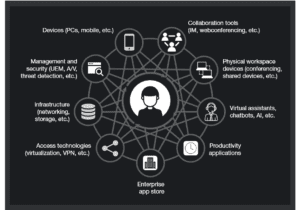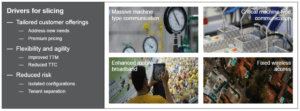Twitter Feed
SourceConnecte! Marketplace With A Mission
Earlier this year, GC GlobalNet launched a new breed of B2B e-commerce sites. Curated by Kevin L. Jackson, SourceConnecte (with an “eâ€) went live with three strategic goals in mind: Efficiently leverage modern…
Potential vs. Reality: Is Edge Computing Real?
Edge computing provides compute, storage, and networking resources close to devices generating traffic. Its benefits are based on an ability to provide new services capable of meeting stringent operational requirements…
Enabling Digital Transformation
Digital transformation integrates technology into all areas of an organization’s business or mission. Its fundamental purpose is to create and deliver innovative and industry-changing products and services to a global…
The ThinkShield Story Part 1: The Challenge
The cybersecurity challenge seems to be growing daily. Threats are becoming more sophisticated, and attacks are becoming more destructive while the corporate world’s response seems to resemble a deer…
CIO dream team: Who’s in and why?
Today’s CIO navigates the twin challenges of enabling new business models and managing rapid technological change. Cloud computing strategies are now table stakes. CIOs must make complex decisions about using…
Digital Transformation and the Mainframe
Digital transformation infuses digital technology into all areas of an organization’s business or mission. Its fundamental purpose is to create and deliver innovative and industry-changing digital products and services to…
Composable Architecture Q&A. Are you ready?
Q: Is it time for my company to jump on the composable architecture bandwagon? A: Composable architectures are quickly becoming essential to the modern enterprise. Citing a recent Forrester study:…
Increase Productivity by Reducing Technology Distraction: Lessons from Forrester Research
Workplace productivity is hurt every day by the very technology developed and purchased to improve it. Forrester announced this surprising conclusion in their latest “How To Wake Up From The Nightmare…
Unveiling the end-to-end capabilities for the networked society
An Interview with Henrik Basilier By Kevin L. Jackson The telecom industry is rapidly moving towards a future in which networks must have the capabilities of delivering services with the…
AT&T Finance Solutions GM on Shrimping, Software, and CX
Helping clients address the trends and challenges presented by the Financial Services industry is the main focus for René Dufrene in his role as General Manager of Finance Solutions at…
When Congress names a law after you, it’s getting serious. That is where we are now with cloud computing. The Clarifying Lawful Overseas Use of Data Act or CLOUD Act (H.R. 4943) is a United States federal law that amends the Stored Communications Act (SCA) of 1986. This amendment allows federal law enforcement to compel U.S.-based technology companies via warrant or subpoena to provide requested data stored on servers regardless of whether the data are stored in the U.S. or on foreign soil. Industry observers see this as a reaction to the Microsoft vs. United States lawsuit, known on appeal to the U.S. Supreme Court as United States v. Microsoft Corp (Whew!). This data privacy case addressed legal issues associated with US law enforcement efforts to gather electronic data physically stored in a Microsoft datacenter outside of US territory. So why should you care? That “electronic data” was email which is the lifeblood of just about every organization. That, in turn, means that the outcome of this still unsettled case could affect how and where you store corporate email.
While the case was under review by the Supreme Court, Congress passed the CLOUD Act which resolves concerns related to the initial warrant. Although passage of the law made the case moot and vacated an earlier legal decision, an enterprise that may have email stored in overseas locations could find themselves choosing between violating foreign data privacy laws, like the General Data Protection Regulation (GDPR) or violating the US CLOUD Act. This unenviable position is preventable by seriously focusing on your current cloud storage vendor arrangements.
If you’re like many organizations, you have consolidated your cloud storage infrastructure with a single vendor. On the surface, this seems like a logical path, but in reality, that strategy could open you up to some serious risks. The most obvious one is vendor lock-in which could leave you operationally dependent on that single provider. It could also make it impossible for you to change providers should the business relationship fail for some reason. A second issue is driven by a need for data immutability. Data pedigree must be beyond reproach, and an essential requirement for protecting this pedigree is data immutability. This term describes a data property of being unchanging or unable to be changed over time. Immutability is especially important in law enforcement where prosecutors rely on data to prove their case. If you’re operating within the United States, the CLOUD Act adds additional uncertainty to any risk calculation. Enterprises must take a look at classifying their data based on applicable data sovereignty laws which describe the notion that information stored in binary digital form is subject to the laws of the country in which it is located.
An effective mitigation strategy for these risks could be establishing a secondary cloud storage vendor. This move would:
- Eliminate the possibility of cloud storage vendor lock-in;
- Provide data portability options should the business relationship fail for any reason;
- Help establish auditable procedures for the management of any data subject to US data sovereignty laws; and
- Establish and maintain data immutability.
If you need to take action toward mitigating your organization’s cloud storage risks, Wasabi could be a good option. Their “Hot Storage” solution is deployed in fully secure, redundant, and SOC-2, ISO 27001, and PCI-DSS certified data centers. The company’s primary production data centers are in Virginia and Oregon with additional European Union data centers coming available later this year. Wasabi is also one of the few cloud service providers capable of meeting data immutability standards which include:
- Ensuring that none of the provider’s employees can change application code on a production system without first undergoing thorough review and testing
- Confirmation that all data centers contain appropriate physical security using things like biometric access control and man-traps.
- Data guarantees at least 11 nines in durability; and
- Every data object is read every 90 days to detect and automatically correct any random errors.
Cloud Computing
- CPUcoin Expands CPU/GPU Power Sharing with Cudo Ventures Enterprise Network Partnership
- CPUcoin Expands CPU/GPU Power Sharing with Cudo Ventures Enterprise Network Partnership
- Route1 Announces Q2 2019 Financial Results
- CPUcoin Expands CPU/GPU Power Sharing with Cudo Ventures Enterprise Network Partnership
- ChannelAdvisor to Present at the D.A. Davidson 18th Annual Technology Conference
Cybersecurity
- Route1 Announces Q2 2019 Financial Results
- FIRST US BANCSHARES, INC. DECLARES CASH DIVIDEND
- Business Continuity Management Planning Solution Market is Expected to Grow ~ US$ 1.6 Bn by the end of 2029 - PMR
- Atos delivers Quantum-Learning-as-a-Service to Xofia to enable artificial intelligence solutions
- New Ares IoT Botnet discovered on Android OS based Set-Top Boxes










